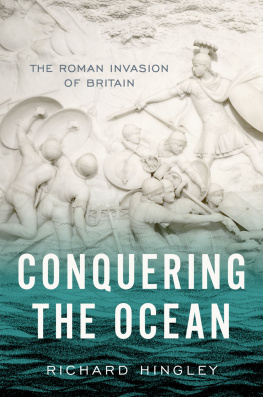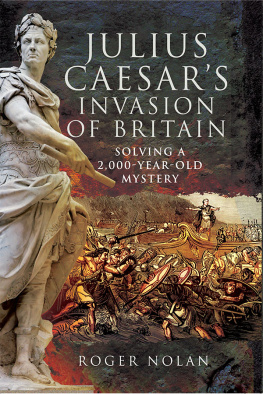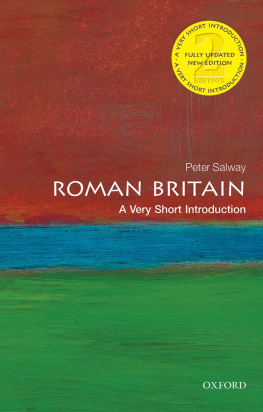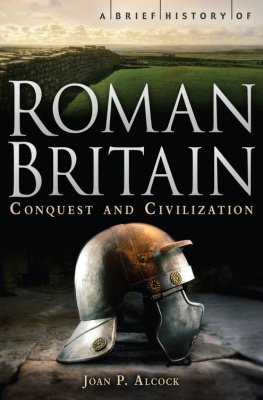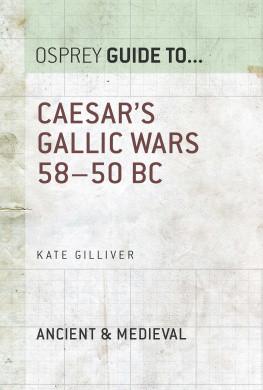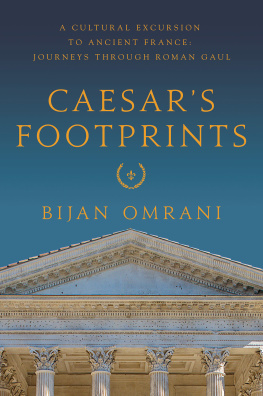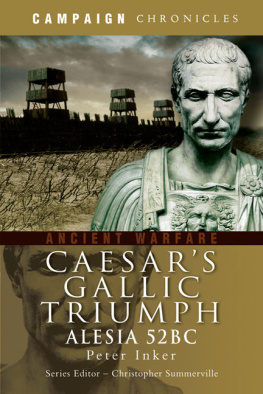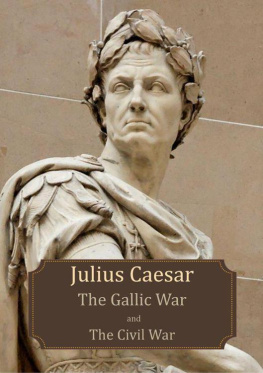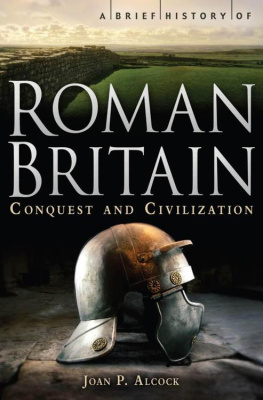
Conquering the Ocean
Ancient Warfare and Civilization
SERIES EDITORS:
RICHARD ALSTON ROBIN WATERFIELD
In this series, leading historians offer compelling new narratives of the armed conflicts that shaped and reshaped the classical world, from the wars of Archaic Greece to the fall of the Roman Empire and the Arab conquests.
By the Spear
Philip II, Alexander the Great, and the Rise and Fall of the Macedonian Empire
Ian Worthington
Taken at the Flood
The Roman Conquest of Greece
Robin Waterfield
In Gods Path
The Arab Conquests and the Creation of an Islamic Empire
Robert G. Hoyland
Mastering the West
Rome and Carthage at War
Dexter Hoyos
Romes Revolution
Death of the Republic and Birth of the Empire
Richard Alston
The Plague of War
Athens, Sparta, and the Struggle for Ancient Greece
Jennifer T. Roberts
Rome Resurgent
War and Empire in the Age of Justinian
Peter Heather
Conquering the Ocean
The Roman Invasion of Britain
Richard Hingley

Oxford University Press is a department of the University of Oxford. It furthers the Universitys objective of excellence in research, scholarship, and education by publishing worldwide. Oxford is a registered trade mark of Oxford University Press in the UK and certain other countries.
Published in the United States of America by Oxford University Press
198 Madison Avenue, New York, NY 10016, United States of America.
Oxford University Press 2022
All rights reserved. No part of this publication may be reproduced, stored in a retrieval system, or transmitted, in any form or by any means, without the prior permission in writing of Oxford University Press, or as expressly permitted by law, by license, or under terms agreed with the appropriate reproduction rights organization. Inquiries concerning reproduction outside the scope of the above should be sent to the Rights Department, Oxford University Press, at the address above.
You must not circulate this work in any other form and you must impose this same condition on any acquirer.
Library of Congress Cataloging-in-Publication Data
Names: Hingley, Richard, author.
Title: Conquering the ocean : the Roman invasion of Britain / Richard Hingley.
Description: New York, NY : Oxford University Press, [2022] |
Series: Ancient warfare and civilization | Includes bibliographical references and index.
Identifiers: LCCN 2021037374 (print) | LCCN 2021037375 (ebook) |
ISBN 9780190937416 (hardback) | ISBN 9780197555002 |
ISBN 9780190937430 (epub) | ISBN 9780190937423
Subjects: LCSH: RomansGreat Britain. | Great BritainHistoryRoman period,
55 B.C.449 A.D. | Great BritainHistory, Military55 B.C.449 A.D. |
Great BritainHistoryInvasions. | RomeHistory,
Military26530 B.C. | RomeHistory, Military30 B.C.476 A.D. |
Great BritainAntiquities.
Classification: LCC DA145 .H497 2022 (print) | LCC DA145 (ebook) |
DDC 936.1/04dc23
LC record available at https://lccn.loc.gov/2021037374
LC ebook record available at https://lccn.loc.gov/2021037375
DOI: 10.1093/oso/9780190937416.001.0001
Dedicated to Anthony (Tony) Birley (19372020), in memory of his scholarship and a precious friendship.

Preface
There is, however, no detailed discussion of the chronology of the Roman conquest of Britain in this Handbook; and none of the essays it contains consider the motivations of the emperors and commanders who led the invasion of Britainthese topics are usually left to the ancient historians. In this sense, the approach taken in this book, which focuses on the Roman conquest, echoes a tradition of the study of the Roman elite that many archaeologists of my generation have long been determined to critique. Research in archaeology has now progressed to the point that we are much better able to appreciate the lives of people in the past who were not particularly privileged, and although I draw attention to this information here wherever possible, my main aim is to return attention to the military acts and political decisions that led to the conquest itself.
Because the amount of information provided by the surviving classical texts is limited, recent work on Roman Britain has been dominated by archaeologists. Despite this, however, a fresh seam of research in classical literature has emerged to shed new light on how the Roman elite viewed Britain and its peoples. The archaeological information drawn upon here is published in many different books and journals.
This book seeks to navigate the division between accounts of classical literature and studies of archaeological materials. It also aims to cross another intellectual boundary hampering research, that between the studies of Iron Age and of Roman Britain. While researching and writing this work, I have also been encouraged and inspired by the publication of an impressive body of research on the Roman conquests of Iberia, Gaul, and Germany. Although I have needed to gloss over various disagreements in the interpretation of the events narrated here, I have included references in the notes to works that complicate my simplified narrative.
I am particularly grateful to Stefan Vranka at Oxford University Press (New York) for the invitation to write this book. My research has been , while Matthew Symonds commented on the entire text. I am also most grateful to Paul Bidwell, Andrew Birley, David Breeze, Barry Burnham, John Creighton, Philip Crummy, Manuel Fernndez-Gtz, Andrew Fitzpatrick, Adam Gwilt, William Hanson, Nick Hodgson, Lynn Pitts, Kurt Raaflaub, Duane W. Roller, Chris Rudd, Michael Shanks, Robert Strassler, Ilkka Syvanne, the series editors, and the anonymous reviewer for their help and advice with the text and images.
Richard Hingley
Holly Tree Lodge, Shincliffe, Durham, UK
10 June 2021

Contents
Why should a distant island beyond the north-western edge of the Roman Empire have become the target of Roman ambitions for conquest? Julius Caesar was the first Roman to campaign in Britain. He tells us that little was known about the land or its people before this, and that his desire to know more motivated both his landing in south-east Britain in 55 bce and his return with a larger army the following year. With these campaigns Caesar intended to extend his conquest of the vast lands of Gaul, already achieved over the previous three campaigning seasons. Members of the Roman elite were particularly attracted to the mysterious land of Britain, as they thought of the world as a large island surrounded by the waters of Ocean (). Ocean had a special attraction.
The Romans inherited the worship of Oceanus from the Greeks, and believed that the waters surrounding the inhabited world were endless.); but even so great a hero as this half-god did not reach the islands of Britain.
At about the same time Alexander was campaigning in India, however, the Greek traveller Pytheas had sailed to Britain, and beyond, to the mythical island of

